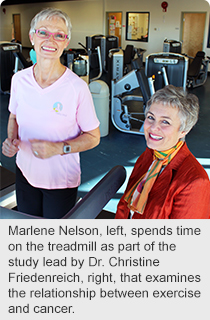
July 28, 2015
Story by Kristin Bernhard
Five hours of exercise per week can reduce the risk of developing cancer, including breast cancer, in post-menopausal women, according to an Alberta Health Services (AHS) research study.
Body fat, abdominal fat and adult weight gain have been associated with increased risk of postmenopausal breast cancer. Five years ago, Dr. Christine Friedenreich and her colleagues launched the Breast Cancer and Exercise Trial in Alberta (BETA) – the first study that attempted to pinpoint exactly how much exercise is required by post-menopausal women to reduce their risk of breast cancer.
 “Postmenopausal women who exercised 300 minutes per week were better at reducing total fat and other measures, especially obese women, during a one-year clinical trial, and reduced body fat can mean a reduced risk of cancer,” says Dr. Friedenreich, scientific leader of cancer epidemiology and prevention research at AHS.
“Postmenopausal women who exercised 300 minutes per week were better at reducing total fat and other measures, especially obese women, during a one-year clinical trial, and reduced body fat can mean a reduced risk of cancer,” says Dr. Friedenreich, scientific leader of cancer epidemiology and prevention research at AHS.
The study is an extension to the ALPHA (Alberta Physical Activity and Breast Cancer Prevention) trial, which found previously inactive post-menopausal women can lower their risk of breast cancer by following a moderate- to vigorous-intensity exercise program. That study found that several biomarkers associated with breast cancer were significantly reduced in women who followed the exercise program compared to the controls who did not exercise.
In the BETA trial, participants were randomized into two specific groups that were asked to do either 150 or 300 minutes of aerobic exercise per week. Tests and measurements were taken at the beginning and end of the year-long exercise intervention and compared across the two groups. Several breast cancer biomarkers – including levels of body fat, estrogen, insulin resistance and inflammation – were also examined.
Reporting in JAMA Oncology, Friedenreich found that the women exercising 300 minutes weekly lost one kilogram — about 2.2 pounds — more body fat than those in the 150-minute group. Much larger changes in several components of body fat were observed in the 300-minute weekly group, particularly among obese women (with a body mass index over 30).
“Exercise can cause body fat to drop which is especially important for cancer of the breast since fatty tissue is the primary source of hormones that can drive breast cancer after menopause,” says Dr. Friedenreich.
“For cancer prevention, doing 150 minutes of activity a week is good, but 300 minutes is better. Being physically active is a powerful way to reduce your risk of getting cancer. The evidence is especially strong for some of the most common cancers in Alberta such as breast cancer.”
Research shows that women who have been through menopause are about 25 per cent less likely to develop breast cancer if they are physically active.